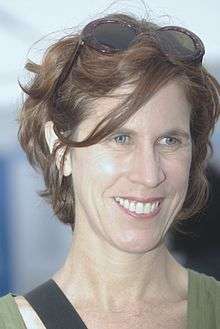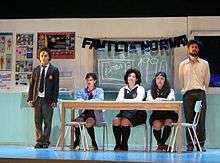Nona Fernández
| Nona Fernández | |
|---|---|
|
At FILSA 2015 | |
| Born |
Patricia Paola Fernández Silanes 23 June 1971 Santiago, Chile |
| Occupation | Actress, writer |
| Notable work | Av. 10 de Julio Huamachuco, La dimensión desconocida |
| Spouse(s) | Marcelo Leonart |
| Awards |
|
Patricia Paola Fernández Silanes (born 23 June 1971), better known as Nona Fernández, is a Chilean actress, author, and screenwriter.[1]
Biography
The only daughter of a single mother, Nona Fernández grew up in a neighborhood on Matta Avenue near the Bíobío market. It was there that she had her first job, selling used clothes.[2]
Although officially registered with the same name as her mother's dentist, Patricia Paola, everyone called her Nona, the name with which she also signs her works. This came about because at first she spoke little – almost nothing. "The only thing she knew how to say was the monosyllabic, sharp, 'no'." That refusal turned into her child's crutch; she earned the peculiar nickname Nonito in her family. When she grew up, the nickname became Nona.[2]
She studied at the Santa Cruz de Santiago School and later at the Theater School of the Catholic University.
As an actress, she founded the company Merri Melodys, participated in productions of many theater plays, and won a contest of the Chilean-American Cultural Center as best actress.[3]
Fernández participated in a workshop of Antonio Skármeta in 1995, the same year she won the Gabriela Mistral Literary Games. Her stories appeared first in various anthologies of competitions, and her first book of stories came to light in the year 2000: El Cielo. Two years later she published her award-winning novel Mapocho.
On the gestation of that first novel, she said:
I wrote my first novel in a flat in Barcelona, looking at Chile from a distance, and filling pages with crazy interpretations about its homeland history, while my belly grew with a child who was looking for space. I had a son and finished a book at the same time. My son's name is Dante. The book was called Mapocho, like the river that crosses my city, the same one that has moved trash and the dead forever.[4]
Her partner, Dante's father, is the writer and theater director Marcelo Leonart, whom she met when they both studied at the Theater School. Together they own the company La Fusa.
She defines herself with these words: "Actress for pleasure, storyteller for busting balls, for not forgetting what should not be forgotten. Screenwriter of soap operas by necessity, uncomfortable Chilean, and sometimes rabid."[4]

Her work as a television screenwriter is, for Nona Fernández, just a way to make a living. At TVN, she has become head of scripts for El Laberinto de Alicia. She also writes for the series Los archivos del cardenal, based on the cases defended by the Vicariate of Solidarity during the dictatorship of Augusto Pinochet.[1] She worked on the script of Andrés Waissbluth's film 199 recetas para ser feliz, and on the documentary La ciudad de los fotógrafos by Sebastián Moreno.
In 2011, she was selected – together with two other Chileans: Diego Muñoz Valenzuela and Francisco Díaz Klaassen – as one of the "25 literary treasures waiting to be discovered" – writers "whose talent has been consolidated in their countries, but who are still little known outside of them" – by the Guadalajara International Book Fair to celebrate its 25th anniversary.[4][5]
She debuted as a playwright in 2012, with El taller, a piece inspired by the literary workshop that Mariana Callejas held at her home in Lo Curro, while her husband Michael Townley directed the operations of a DINA barracks in the basement.[6] This black comedy – staged by the company of Leonart and Fernández, La Fusa, premiered in April at the Santiago theater Lastarria 90, and relocated in August to the Gabriela Mistral Cultural Center[7] – won the 2013 Altazor Award in the Dramaturgy category.[8] Her second piece, Liceo de niñas, premiered in 2015 (with it, the company led by the author and Leonart was renamed Pieza Oscura);[9] it is "a fantastic comedy about an overwhelmed science teacher who discovers in the laboratory of his establishment three students who remain hidden by a shot taken in 1985."[10]
Works

Novels
- 2002: Mapocho, Planeta
- 2007: Av. 10 de Julio Huamachuco, Uqbar
- 2012: Fuenzalida, Mondadori, Santiago
- 2013: Space invaders, Alquimia, Santiago
- 2015: Chilean Electric, Alquimia, Santiago
- 2016: La dimensión desconocida, Penguin Random House, Santiago
Short stories
- 2000: El Cielo, Cuarto Propio. 7 stories: "Marion", "Blanca", "Emilia", "El cielo", "Zapato roto", "Primero de noviembre", and "Maltés"
In anthologies
- 1994: Música ligera (Grijalbo)
- 1996: Pasión por la música (Lom)
- 1997: Cuentos extraviados (Alfaguara; with "Blanca")
- 1998: Queso de cabeza y otros cuentos (with "El Cielo")
Theatrical dramas
- El taller: released in April 2012; published in the book Bestiario, freakshow temporada 1973/1990, together with Grita (2004, by Marcelo Leonart) and Medusa (2010, by Ximena Carrera): Ceibo Ediciones, Santiago, 2013[11]
- Liceo de niñas: released on 23 October 2015 by the company Pieza Oscura at the Theater of the Catholic University,[9] with direction by Marcelo Leonart and acting by the author, among others, who plays the role of a mute student.[10] Published by Ediciones Oxímoron in 2016.
Television series scripts
Original stories
- 2011: El Laberinto de Alicia (rewritten in 2014 as the Colombian series El laberinto de Alicia with Tania Cárdenas and Santiago Ardila)
- 2005: Los treinta (with Marcelo Leonart, Hugo Morales, and Ximena Carrera)
- 2003: 16 (telenovela) (with Marcelo Leonart)
Adaptations
- 2013: Secretos en el jardín – originally by Julio Rojas y Matías Ovalle
- 2011: Los archivos del cardenal – originally by Josefina Fernández
- 2009: Conde Vrolok – originally by Rodrigo and Felipe Ossandón, and Jorge Ayala
- 2009: ¿Dónde está Elisa? – originally by Pablo Illanes
- 2007: Alguien te mira – originally by Pablo Illanes
- 2004: 17 – originally by Marcelo Leonart
- 2002: El circo de las Montini – originally by Víctor Carrasco
- 1999: Aquelarre – originally by Hugo Morales
- 1998: Iorana – originally by Enrique Cintolesi
Awards and recognitions
- 1995: First place of the Gabriela Mistral Literary Games, for the story "Marsellesa"
- 1996: First prize in the Passion for Music literary contest
- 1997: Finalist in the Paula magazine story contest, for "Blanca"
- 1998: Finalist in Paula magazine story contest, for "El Cielo"[3]
- 2000: Finalist for the Altazor Award in the TV Script category with Aquelarre (ex aequo)[12]
- 2003: Santiago Municipal Literature Award for Mapocho[13]
- 2004: Finalist for the Altazor Award in the TV Script category with 16 (ex aequo)[14]
- 2006: Altazor Award in the TV Script category for Los treinta (ex aequo)[15]
- 2008: Altazor Award in the TV Script category for Alguien te Mira (ex aequo)[16]
- 2008: Santiago Municipal Literature Award for Av. 10 de Julio Huamachuco[13]
- 2010: Finalist for the Altazor Award in the TV Script category with Conde Vrolok (ex aequo)[17]
- 2010: Finalist for the Altazor Award in the TV Script category with ¿Dónde está Elisa? (ex aequo)[18]
- 2012: Altazor Award in the TV Script category for Los archivos del cardenal (ex aequo)[1][19]
- 2013: Altazor Award in the Dramaturgy category for El taller[8]
- 2016: Award of the National Council of Culture and the Arts for the best novel in the Published Works category for Chilean Electric[20]
- 2017: Sor Juana Inés de la Cruz Prize for La dimensión desconocida[13]
References
- 1 2 3 Nelmes, Jill; Selbo, Jule, eds. (29 September 2015). "Chile". Women Screenwriters: An International Guide. Springer. p. 879. ISBN 9781137312372. Retrieved 27 January 2018 – via Google Books.
- 1 2 Núñez, Natalia (2 May 2012). "Nona Fernández, la escritora multifacética" [Nona Fernández, the Multifaceted Writer]. El Mercurio Ya (in Spanish). Retrieved 27 January 2018.
- 1 2 Sánchez, Alejandra (29 September 2008). "Nona Fernández: Finalmente Tom se come a Jerry" [Nona Fernández: Finally Tom Eats Jerry]. La Pollera. Archived from the original on 4 March 2016. Retrieved 27 January 2018.
- 1 2 3 "Los 25 secretos mejor guardados de América Latina" [The 25 Best Kept Secrets in Latin America] (in Spanish). Guadalajara International Book Fair. Archived from the original on 26 September 2011. Retrieved 27 January 2017.
- ↑ Sabogal, Winston Manrique (20 September 2011). "25 secretos literarios de Latinoamérica en la FIL" [25 Literary Secrets of Latin America at the FIL]. El País (in Spanish). Madrid. Retrieved 27 January 2018.
- ↑ Navarrete, Pilar (3 May 2012). "El taller una obra inspirada en Mariana Callejas" [El Taller a Play Inspired by Mariana Callejas]. Paula (in Spanish). Retrieved 27 January 2018.
- ↑ "GAM repone obra sobre el taller de literatura de la Dina" [GAM Restages Play About the DINA Literary Workshop]. La Tercera (in Spanish). 6 August 2012. Retrieved 27 January 2018.
- 1 2 "El Taller" (in Spanish). Altazor Award. Archived from the original on 3 April 2015. Retrieved 27 January 2018.
- 1 2 "Hoy se estrena 'Liceo de Niñas' de Nona Fernández en Teatro UC" [Today 'Liceo de Niñas' by Nona Fernández Premieres at the UC Theater] (in Spanish). Radio Bío-Bío. 23 October 2015. Retrieved 27 January 2018.
- 1 2 Guerrero, Pedro Pablo (15 November 2015). "Nona Fernández regresa al teatro y a la novela" [Nona Fernández Returns to the Stage and the Novel]. El Mercurio (in Spanish). Retrieved 27 January 2018.
- ↑ Etcheverría, Estefanía (25 May 2013). "Bestiario, una historia teatral del régimen en el teatro y el papel" [Bestiario, a Theatrical History of the Regime On Stage and On Paper]. La Tercera (in Spanish). Retrieved 27 January 2018.
- ↑ "Aquelarre" (in Spanish). Altazor Award. Archived from the original on 31 August 2011. Retrieved 27 January 2018.
- 1 2 3 "La escritora chilena Nona Fernández obtiene en México el Premio Sor Juana Inés de la Cruz" [The Chilean Writer Nona Fernández Gets the Sor Juana Inés de la Cruz Prize in Mexico]. El Mostrador (in Spanish). 30 October 2017.
- ↑ "16" (in Spanish). Altazor Award. Archived from the original on 3 April 2015. Retrieved 27 January 2018.
- ↑ "Los Treinta" (in Spanish). Altazor Award. Archived from the original on 11 March 2012. Retrieved 27 January 2018.
- ↑ "Alguien te mira" (in Spanish). Altazor Award. Archived from the original on 13 April 2015. Retrieved 27 January 2018.
- ↑ "Conde Vrolok" (in Spanish). Altazor Award. Archived from the original on 2 December 2010. Retrieved 27 January 2018.
- ↑ "¿Dónde está Elisa?" (in Spanish). Altazor Award. Archived from the original on 23 December 2014. Retrieved 27 January 2018.
- ↑ "Serie 'Los Archivos del Cardenal' arrasó en Premios Altazor 2012" [Series 'Los Archivos del Cardenal' Sweeps the 2012 Altazor Awards]. La Nación (in Spanish). 8 May 2012. Archived from the original on 2 April 2015. Retrieved 27 January 2018.
- ↑ "Consejo de la Cultura da a conocer los ganadores de los Premios Literarios 2016" [Council of Culture Recognizes the Winners of the 2016 Literary Awards] (in Spanish). National Council of Culture and the Arts. 4 November 2016. Retrieved 27 January 2018.